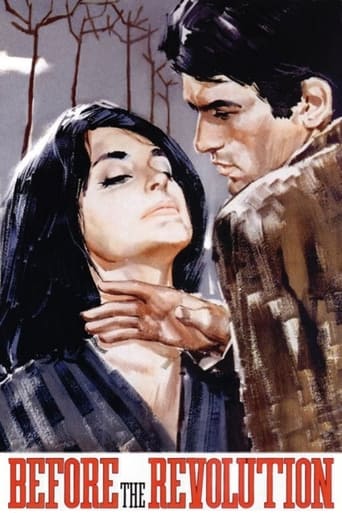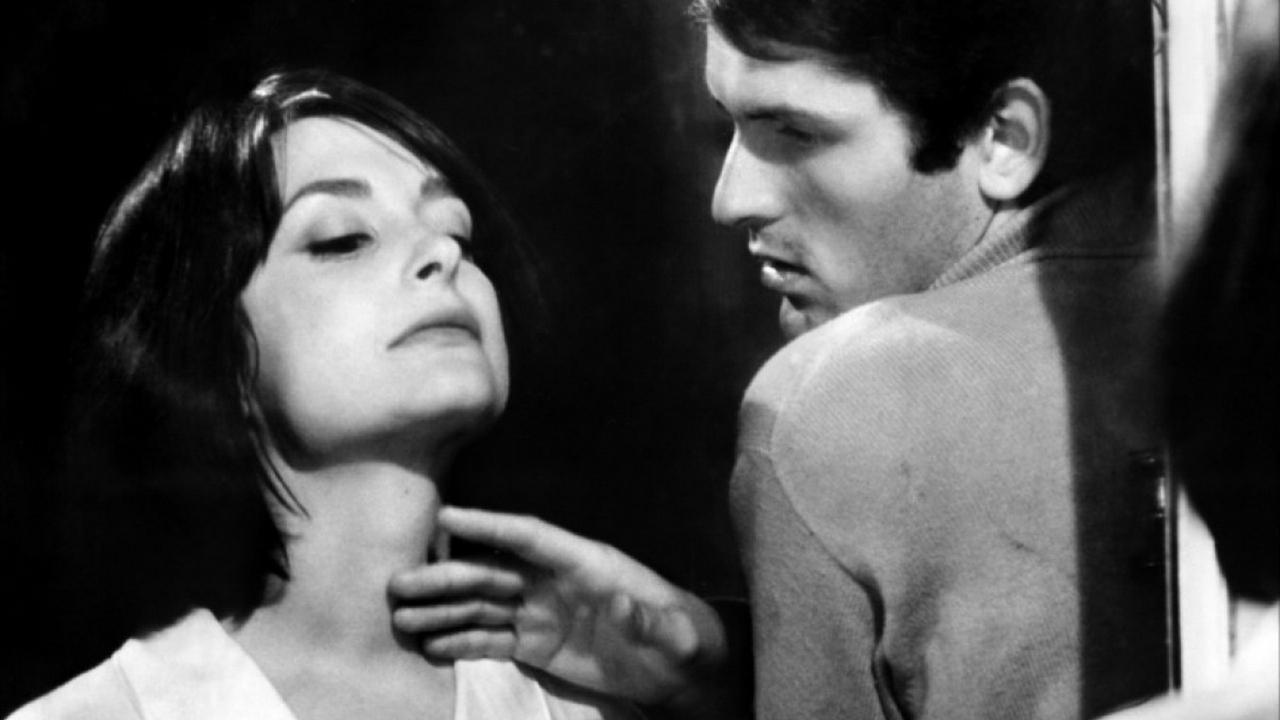runamokprods
While hailed as many as a masterpiece (or near), I struggled with Bertolucci's 2nd film, made when he was only 23, although I am a fan of his in general. Beautifully shot, great use of music and unconventional editing, the film is excellent on a film-making and craft level (although it perhaps borrows too liberally from leading film-makers of the era, especially Godard, Antonioni and Resnais). The story of a young bourgeois man trying to come to terms with his tear between his attraction to communism and his desire for an easier life leads him into an incestuous affair with his somewhat older aunt. I found it's themes somewhat muddled, alternating between being heavy-handedly spelled out, or so obtuse I wasn't sure what a given scene was saying. The acting in particular seems a bit all over the place; understated to the point of flatness in one scene, and then almost theatrically over the top the next. At the end I felt glad I'd seen the film, but it didn't stick with me the way Bertolucci's first film "La Commare Secca" or his third "Partner" did. ("Partner" deals with some of the same themes, but in a far more playful, often comedic way). There was a film-school sort of pretentiousness and emotional distance in "Before the Revolution that kept me from feeling moved or from being led to think deeply about the ideas. That said, I am willing to revisit it and see if my reaction changes, and certainly I enjoyed Bertolucci's already masterful use of image and sound, even if the ends he was using them to were a bit muddled.
kgemes
Allegedly based on Stendahl's Charterhouse of Parma (Parma is about the only thing the film and the book have in common) this literate, evocative masterpiece was made by Bertolucci in his early twenties. It is, among other things, an astoundingly clear-headed study of a certain kind of haute bourgeois flirtation with (communist) ideology. As Fabrizio, the main character observes, "For me ideology was simply a vacation". Bertolucci, himself a haute bourgeoisie who maintained long-time sympathy for the communist party, nicely contrasts Fabrizio with his mentor, the poor elementary school teacher Cesare who lives the life of a committed party member. When Fabrizio complains that the masses the party is allegedly fighting for simply want the same empty life enjoyed by the bourgeoisie, while he joined the party in the hopes of creating a new man, his mentor simply replies that the workers want to better their economic conditions and that is right. There are two scenes involving speeches of dazzling virtuosity; one where a once rich landowner says goodbye to the estate that is soon to be taken from him, "Here life finishes, and survival begins", and a scene were Fabrizio coins the immortal phrase "Nostalgia for the present". Both the black and white photography and the imposing classical score add to the poignancy of this dreamy farewell paean to a naïve, idealistic, sensibility, that for some time animated the better hearts of educated middle class Europe and somehow managed to live on in a kind of phantasmagoric existence even after the events of 39-45 the film is set in the early 60s. As a coming of age film it cleverly juxtaposes questions of political disenchantment with romantic (as in sexual) enlightenment; again the wise Cesare reproaches Fabrizio for confusing his alleged disappointment with ideology with his inability to face his botched relationship with Gina his first love (and his aunt!). Some will find this film rather slow and overly literate. Others will find the key interest of the film lies in its technical virtuosity and its playful references to the work of French Nouvelle Vague auteurs. Both reactions are a sad measure of how far the world Bertolucci so successfully evokes has receded from memory; as Bertolucci quotes from Talleyrand in the prologue to the film "Those who did not live before the revolution do not know how sweet life can be".
MisterWhiplash
On occasion while watching Bernardo Bertoulcci's Before the Revolution, which I have done about four times within the past year, I really felt like I was watching someone with a full love of cinema. Not just of how it can distort our perceptions of reality by how close or far or following the subjects are, but that there's a certain purity to it. When a filmmaker has this much bursting out of him at 22, 23 years old, you're bound to find it coming out much like someone that age- still on the brink of life, full of ideas, and still treated in a couple of minor, even unintentional ways, as a kid. Bertolucci tapped into the vein of the changing of the guard in European cinema with vitality. Like in poetry, the moods and music in the language (or, here, the grammar of film itself) tends to move along with the expressions used to make it so personal you know no one else could have done it this way. Even when it might stumble the film almost seems to pick itself back up, plunging us right into the gut of its subject matter. At times only Last Tango in Paris, Bertolucci's masterpiece, came close with its honesty of what's going on in the world for these people.And, in truth, the film's structure would not work without some level of honesty to the viewer, or at the least saying with the random, seemingly sometimes mundane set of events 'it's got to be this way, at least for this character.' How much of it is based from Bertolucci's life I'm not certain. But his lead character, Fabrizio (Francesco Barilli, in a splendidly conflicted performance), is not necessarily a great young future leader of men or something. He's a bourgeois -the word is used quite a number of times in the film- and filled with ideals about a Marxist-style revolution, perhaps. For the most part though he wanders, thinks in quotes, and is close to his Aunt Gina (Adriana Asti, perfect for the part). It is dealing with this relationship that the filmmaker has to find his stride most, and he does. It goes from quiet, to cute, to talkative, to confused, then to something more risqué- passionate. When the character's cross the line, one may want to suddenly find some of what proceeds as taboo. It's not the case.What turns Before the Revolution into something not as troubling as the subject matter might appear, Bertolucci utilizes a style that corresponds with the scatter-shot frame of mind in the character's story. The plot is 'linear', but there are times where the sort of Italian frame of romanticism comes into play as well. Because the poetry of the emotions helps make this not as potentially pretentious as some of these scenes could come across, it is not without notice that upon once or twice times the subject matter goes into confusing points. The scenes late in the film involving Puck, for example, become so into the realm of the literary that it goes beyond interesting and into the dangerous realm of the self-indulgent (which is understandable given the filmmaker's talents). Though Italian to the bone, here and there I almost wondered if at times Truffaut and Godard, switching off like hitters in a batting cage, were in the back of Bertolucci's mind as he wrote the script or filmed a scene.It doesn't hurt at all, of course, that two great musicians contribute to the film. One is Ennio Morricone, who co-wrote the music and performed for the film, and though not mentioned on IMDb, the great Gato Barbieri is also credited in the music. It's not just them but also the whole backbone of the music in the film. It adds that kick that is in many an Italian romance/drama, and also touches of ironic humor, of the joyfulness of youth (i.e. riding the bike early on), and songs used for effectiveness ahead of its time.By also entrusting much of his own vision into the hands and eyes of Aldo Scavarda, Bertolucci gets cinematography that makes it apparent how with many of his films his style is apparent in every one. That it starts off so rough, yet with delicacy, and combining it with a lot to contemplate in terms of what love is, what politics mean for the well off and the not-so well off, and an uneasy feeling of hopelessness. It's one of the more breathtaking visions to come from a director younger than 25 in the post-Italian new-wave.It's not too much of a wonder then Scorsese lists this as his primary influence to make Who's That Knocking at my Door. 9.5/10
dwpollar
1st watched 10/17/2005 - 3 out of 10(Dir-Bernardo Bertolucci): Confusing, talkative, political romantic drama, I think. This is one of Bernardo Bertolucci's first films and was supposedly a breakthru film for him, but I just didn't get it. It probably has something to do with the fact that I'm an American with very little understanding of the Italian Revolution and what it meant for the people who lived there, but it also has to do with Bertolucci's lack of any kind background given to the characters. We are greeted with the main character, Fabrizio, running through the streets with his thoughts being displayed as he runs. He meets up with a friend who he urges to become a member of the Party(the Italian Communist Party) and the next thing we know he drowns, and we're at his funeral. Here Fabrizio, reacquaints himself with Aunt Gina, whom he met at another funeral years before, and they start a deeper relationship that lasts thru most of the rest of the movie. The only other character of note is a Communist Tutor named Cesaro, whom Fabrizio speaks highly of but once we meet him we're not quite sure why. Nothing really happens besides this and no-one really does any kind of changing from the beginning to the end and we're left with what appears to be a silly romantic movie in the end. This is at least, all I was able to get out of this movie despite it's attempts at getting me to understand something else. I'm sorry, it just didn't happen for me.


 AD
AD




